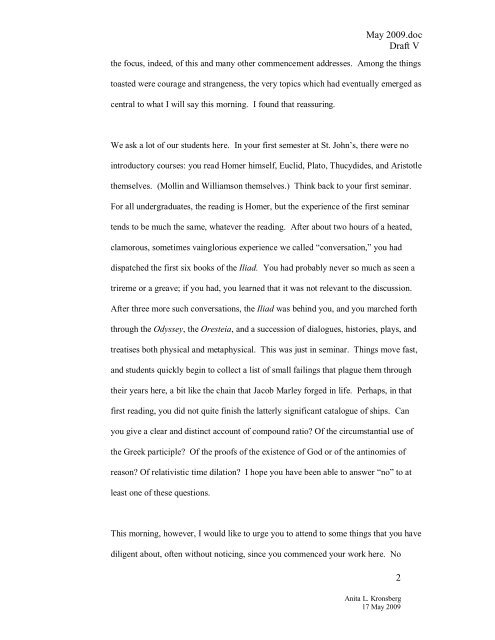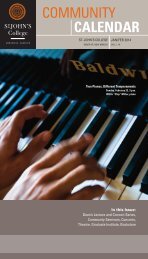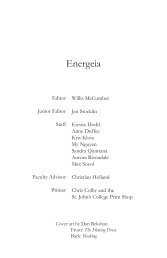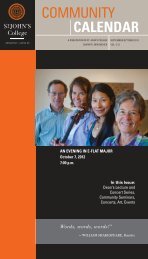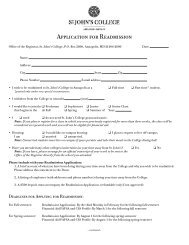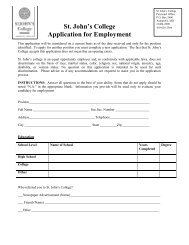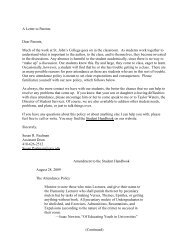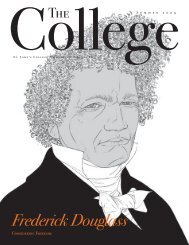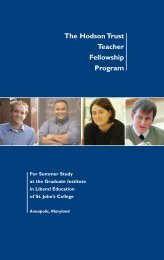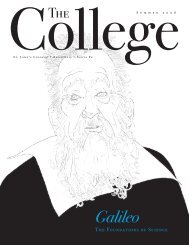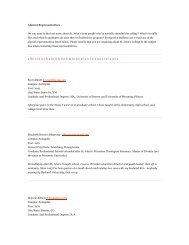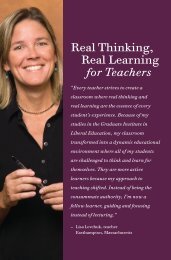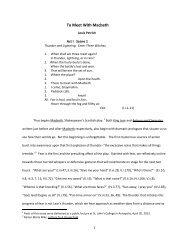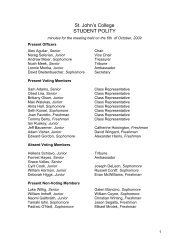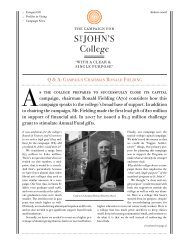Read the Commencement address - St. John's College
Read the Commencement address - St. John's College
Read the Commencement address - St. John's College
Create successful ePaper yourself
Turn your PDF publications into a flip-book with our unique Google optimized e-Paper software.
May 2009.doc<br />
Draft V<br />
<strong>the</strong> focus, indeed, of this and many o<strong>the</strong>r commencement <strong>address</strong>es. Among <strong>the</strong> things<br />
toasted were courage and strangeness, <strong>the</strong> very topics which had eventually emerged as<br />
central to what I will say this morning. I found that reassuring.<br />
We ask a lot of our students here. In your first semester at <strong>St</strong>. John’s, <strong>the</strong>re were no<br />
introductory courses: you read Homer himself, Euclid, Plato, Thucydides, and Aristotle<br />
<strong>the</strong>mselves. (Mollin and Williamson <strong>the</strong>mselves.) Think back to your first seminar.<br />
For all undergraduates, <strong>the</strong> reading is Homer, but <strong>the</strong> experience of <strong>the</strong> first seminar<br />
tends to be much <strong>the</strong> same, whatever <strong>the</strong> reading. After about two hours of a heated,<br />
clamorous, sometimes vainglorious experience we called “conversation,” you had<br />
dispatched <strong>the</strong> first six books of <strong>the</strong> Iliad. You had probably never so much as seen a<br />
trireme or a greave; if you had, you learned that it was not relevant to <strong>the</strong> discussion.<br />
After three more such conversations, <strong>the</strong> Iliad was behind you, and you marched forth<br />
through <strong>the</strong> Odyssey, <strong>the</strong> Oresteia, and a succession of dialogues, histories, plays, and<br />
treatises both physical and metaphysical. This was just in seminar. Things move fast,<br />
and students quickly begin to collect a list of small failings that plague <strong>the</strong>m through<br />
<strong>the</strong>ir years here, a bit like <strong>the</strong> chain that Jacob Marley forged in life. Perhaps, in that<br />
first reading, you did not quite finish <strong>the</strong> latterly significant catalogue of ships. Can<br />
you give a clear and distinct account of compound ratio? Of <strong>the</strong> circumstantial use of<br />
<strong>the</strong> Greek participle? Of <strong>the</strong> proofs of <strong>the</strong> existence of God or of <strong>the</strong> antinomies of<br />
reason? Of relativistic time dilation? I hope you have been able to answer “no” to at<br />
least one of <strong>the</strong>se questions.<br />
This morning, however, I would like to urge you to attend to some things that you have<br />
diligent about, often without noticing, since you commenced your work here. No<br />
2<br />
Anita L. Kronsberg<br />
17 May 2009


